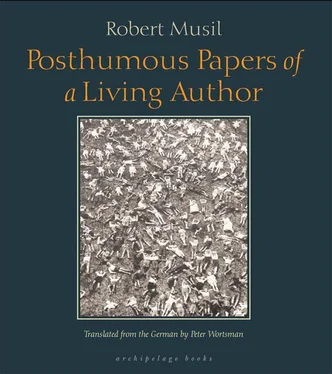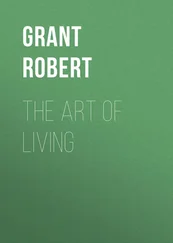And you may not want to believe it, but it is usually for this very reason alone that we ourselves travel to those places depicted in the postcards we buy, a tendency which does not in and of itself make sense, since it would after all be much easier simply to order the cards by mail. And this is the reason why such postcards have to be so overbearingly and over-realistically beautiful; if ever they were to start looking natural, then mankind would have lost something. “So this is what it looks like here,” we say to ourselves and study the card mistrustfully; then we write below: “You can’t imagine how lovely it is. .!” It is the same manner of speaking by which one man confides in another: “You can’t imagine how much she loves me. .”
Who Made You, Oh Forest Fair. .?
When it is very hot outside and you see a forest, you sing: “Who made you, oh forest fair, rise so tall above the ground?” This occurs with automatic certainty and is one of the reflex actions of the German nation. The more unconsciously their heat-parched tongue knocks about in their mouth, and the more like a sharkskin their throat has become, the more passionately will they gather their last strength for a musical finale, and they solemnly affirm that they will sing praises to the master above as long as their voice fills the air. This song is sung with all the obduracy of that idealism which, when all sufferings have come to an end, deserves a drink.
Yet whoever you are, you need only to have been once, for an extended period of time, in the proximity of a sweltering 104° fever, at which the border between death and life begins, to drop all your scorn for this song. You lie there — assuming you have been through a serious accident, have been operated on, and are all patched up again — as a convalescent in the beautiful sanatorium of some health resort, all wrapped up in white sheets and blankets on an airy balcony, and the world is nothing but a distant hum; and chances are, if the sanatorium is so designed, you will also be bedded down in such a way that for weeks you will have nothing before your eyes but the steep, green canopy of trees hugging the side of a mountain. You become as patient as a pebble in a brook, over which the water rushes.
Your memory is still all afever, and you taste nothing but the residual sweet dryness after the anesthesia. And you humbly remember that in the days and nights during which life wrestled over you and the most profound and ultimate thoughts would have been appropriate, you had absolutely nothing on your mind but the same redundant image: on a hike in high summer you are approaching the cool edge of a forest. Again and again this illusion returns, stepping out of the bilious blaze of the sun into the dampness of the dark, only to have to be thrust back again, approaching the same destination through sun-parched fields. How little do paintings, novels, and philosophies count at such moments! In such a weakened state the meager remains of our corporal self close up like a feverish hand, in which our intellectual aspirations melt away like little ice cubes that cannot keep you cool. You resolve henceforth to live a life which is as ordinary as possible, replete with serious attempts to achieve affluence and its rewards, which are as simple and unchanging as the taste of coolness, pleasure, and a quiet occupation. Oh, how you abhor everything out of the ordinary, everything that demands effort and ingenuity when you are sick, and how you long for the eternal, healthy mediocrity common to all men. Is there a problem in that? Let it wait! Sometimes it is a more pressing question, whether in an hour there will be chicken broth or something more invigorating on the table, and you sing to yourself: “Who made you, oh forest fair, rise so tall above the ground?. .” Life seems bent so strangely straight, since, by the way, you never could keep a tune before.
But little by little your recovery proceeds, and with it the evil spirit of the intellect returns. You start observing things. Directly opposite your balcony that green canopy of trees still hugs the side of a mountain, and you still hum that grateful song to it, a habit which all of a sudden you can’t seem to shake; but one day you realize that the forest does not consist only of a series of notes, but of trees, which before you couldn’t tell for the forest. And if you look very closely, you can even recognize how these friendly giants struggle over light and ground with the envy of horses fighting over fodder. They stand quietly side by side, here perhaps a grove of spruce, there a grove of beech trees: it looks naturally dark and light as in a painting, and moralistically edifying as the touching togetherness of families. But, in fact, it is the eve of a thousand-year-long battle.
Are there not seasoned naturalists from whom we can learn that the stalwart oak, today a veritable epitome of solitude, once spread in hordes far and wide throughout Germany? That the spruce, which now supplants everything else, was a relatively recent interloper? That at some time in the past an era of the beech empire was established and, at another time, the imperialism of the alder dominated? There was a migration of the trees, just as there was a migration of the nations, and wherever you see a homogenous native forest, it is in fact an army that established a stronghold on the embattled promontory; and where a variety of trees seem to conjure up an image of happy coexistence, they are really scattered combatants, the surviving remnants of enemy hordes crowded together, too tired and exhausted to continue battle!
This, at any rate, is still poetry, even if it isn’t quite the poetry of peacefulness which we look for in the woods; real nature is above even that. Let nature revive your strength and — insofar as all the advantages of modern nature are put at your disposal — you will likewise make the second observation that a forest consists mostly of rows of boards bedecked by a little greenery. This is no discovery, but merely an avowal of the truth; I suspect that we could not even let our glance dip into the greenery, if all were not prearranged so that our glance was met by straight and even spaces. The sly foresters arrange for a little irregularity, for a tree that steps out of line to the rear of the columns just to catch our glance, for a diagonal branch or a toppled limb left lying there all summer. For they have a subtle sense of nature and know that we would not otherwise believe them. Virgin forests have something highly unnatural and degenerate about them. The unnatural, which has become a second nature in nature, recovers its natural aspect in woods like this. A German forest wouldn’t do such a thing.
A German forest is conscious of its duty, that we might sing of it: “Who made you, oh forest fair, rise so tall above the ground? May our master’s praise resound, as long as my voice fills the air!” That master is a master forester, a chief forester or forest commissioner, who built up the forest in such a way that he would by all rights be very angry if we did not immediately notice his expert handiwork. He provided for the light, the air, the selection of trees, access roads, the location of the lumber camps, and the removal of the tree stumps; and gave the trees that beautiful, perfectly aligned, well-kempt appearance that so delights us when we come home from the wild irregularity of the metropolis.
Behind this forest missionary, who with a simple heart preaches the gospel of the lumber business to the trees, there stands a grounds keeper, a land officer or princely appointee, who writes the rules. According to his ordinances, so many square feet of open space or young saplings are prescribed each year; he distributes the beautiful vistas and the cool shades. But it is not in his hands that the ultimate destiny of the forest lies. Still higher than this authority are the reigning woodland deities, the lumber dealers and their clients, the sawmills, wood pulp plants, building contractors, shipyards, cardboard and paper mills. . Here the connection dissolves in that nameless chaos, the spectral flow of goods and money which accords even the man whose poverty drives him to suicide the certainty that the consequences of his act will affect the economy; and promotes you to the status of superintendent of sheep and woods, all of which can go to hell, when in the sweltering big city summer your pants rub up against a wooden bench and the bench in turn rubs up against your pants.
Читать дальше











